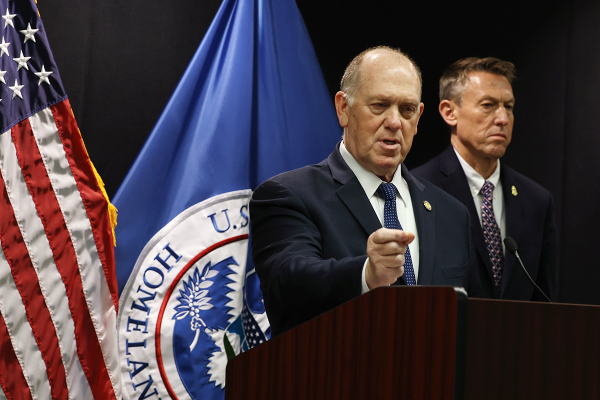Pastor of multiethnic church says identity should come from the cross, not one's race

A black pastor of a multiethnic church recently shared how he identifies more with the cross than he does with the color of his skin and how he believes a Christian’s identity should be rooted in Jesus, not race.
“A lot of people, they look at themselves as a black person or a white person or a Hispanic person,” Pastor Ken Claytor of Alive Church in Gainesville, Florida, told Joni Lamb, host of "Table Talk" in an episode that aired on Oct. 24.
“I look at myself as a born-again person, washed by the blood, who is a child of God, that happens to be black. I don't have a problem with my heritage or my race. I love what I am.”
Claytor, who's also the author of the book, As it is In Heaven: How a Church That Resembles Heaven Can 'Help' Heal Our Racial Divide, explained why he places greater importance on his religious beliefs than his racial identity, and noted that the Church is supposed to be multiracial.
Christians can be racist due to living in a fallen world, added Claytor, who told the host that "some of the racist rhetoric was coming from the Church, especially in the South."
“There were Jim Crow laws that were passed in the South and some people believed that segregation was a godly thing. Not sure what scripture they were using for that one because I got other scriptures that say the opposite,” Claytor said.
“I believe that racism is not just a skin issue. It's a sin issue. And we're the only ones who have the answer to sin, and His name is Jesus. So, the Church should actually be leading the way and be the example.”
Claytor also shared that he's "a little weary of people that might be tired of this topic," given that he believes it will always be relevant to the Church.
“It's almost this pressure, ‘let's keep putting our head in the sand and act like this isn't a problem,'" he said. "But as long as we live in a fallen, broken world, there's going to be all kinds of -isms; sexism, racism, whatever the -isms are. And we have to address it.”
As Christians, it is vital to forgive, Claytor said, citing Luke 23:34, when Jesus said: “‘forgive them, for they know not what they do.’”
“As Christians, we have to forgive because we've been forgiven of so much. And I think we live in a time where it's almost suggested, ‘Well, no, this has been so bad that you can't forgive someone.’ And that's just not true,” Claytor said.
“I don't look at social injustices or racism as, ‘Oh, that's a white problem, a black problem, yellow problem.’ I look at it as a demonic problem. This is not just about a certain group of people. This is about how Satan loves to divide. ‘For a kingdom divided against itself cannot stand.’ He'll use whatever he can to divide us; denominational differences, doctrinal differences and pigment differences.”
Claytor also discussed his upbringing in West Virginia and how his first real experience of racism came during a junior high school class when a girl had him pass a note to another student.
“I opened it up, and it had ‘KKK and white power’ on it," Claytor recounted. "It was just very hurtful. It actually kind of imploded to the place where other kids got involved, and it was like a little mini middle school riot. It kind of felt that way. And so she ended up getting either transferred or expelled."
“Racism is not something that people are born with. If you put a black 1 year old in a crib with a white 1 year old, they're going to love each other as babies. Someone has to teach them to look at life through those lenses. And so, somebody taught her that.”
Claytor shared other memories from his youth when he experienced more racism, such as being called the n-word and getting into the occasional fight.
He also recounted having a crush on a girl who was from a different ethnic group, and her father threatened to pull her out of school when he found out about Claytor's interest.
“And it wasn't because I had treated her wrong or done anything. It was simply because of the color of my skin,” Claytor recounted.
Claytor developed anger and hurt over what happened. But at some point, he said, God intervened and led him to forgive despite the pain he felt.
“I feel like when we go through life's experiences, we can get bitter or get better. And I didn't have a strong walk with Jesus back then. And so, I was a little bitter. … I still had different kinds of friends and things. But in a couple of years outside of college, I rededicated my life to Jesus, I got filled with the Holy Spirit and it was almost like I just got supernatural love,” Claytor said.
“And I got a supernatural lens. And I began to see things from a heavenly perspective more than even from my parent's perspective or other people's perspective. I just began to see things differently.”
Nicole Alcindor is a reporter for The Christian Post. She can be reached at: nicole.alcindor@christianpost.com.





















